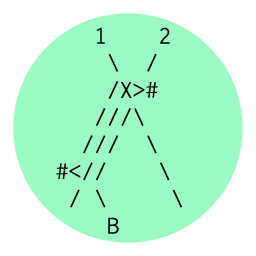
“My practice was always based on the difficulty of having to live in a world where I don’t understand anything.” - Annie Abrahams
The wonderfully strange Apparatus_is {Other-s}, performed online on November 1st, was part of both The Wrong biennale and the Reading Club, an ongoing series by Abrahams and Emmanuel Guez. It began as a code poem, written by Abrahams specifically for the event, and evolved over 20 minutes, as a group of invited “readers” introduced their own changes live for an online audience. These readers included computational poet / author Nick Montfort, artist / coder Renee Carmichael, Emmanuel Guez (co-creator of Reading Club), and “nanoloop musician and javascript nerd” Zombectro (co-creator of surreal o/s Windows93). Their edits were differentiated by color, but it was not announced which color corresponded to which reader, leaving the freedom of psuedo-anonymity in the public performance.
Meanwhile, online bystanders carried a parallel discussion in a live chat window, which became a second kind of performance, reacting to and augmenting the main discussion. Where the main text’s pseudo-code was primarily C++-like, with passages in markup and scripting languages, the comment window accumulated its own mishmash of natural languages, with overlapping conversations in English, French, Dutch, and less familiar (to me) languages. These contributions reacted to the edits as they occurred and became a parallel text, which Abrahams and Guez describe as “an interpretive arena in which, by an intertextual game, each reader plays and foils the writing of the others.”
While previous performances worked with natural language, the code poem by Abrahams brought with it the nullified performativity of the code itself. It was filled with references to the body and to exchanges with other human beings and the machine, emphasizing the gestures that fail to completely traverse those divides. The liveliest discussions emerged in parallel between the text and the chat-window commentary. Gender turned into a particularly rich area for exploration:

From the chat window, as the gender variable is altered:
Alan #include <name.diffraction>
bjørn struct gender;
helen construct gender
helen void it out
Alan Allan is not a proper name.
Cyril gender is power !
helen (a)void gender
The mechanism for Reading Club events is the open-source Etherpad, altered by Clément Charmet to turn the collective brainstorming tool into a performance space. He added controls to set a duration, the speed of playback, and other adjustments to make it re-playable as a “cinematographic archive,“ with progressive edits playing like frames of film, capturing the sense of the performance unfolding.

The Reading Club interface, as Abrahams sets up a new event
Previous Reading Club performances included texts by William S Burroughs and Raymond Queneau. Reading Club also featured an excerpt from the ARPANET Dialogues, a collection of fictitious online discussions, presented as if they had really happened on the pre-internet between such figures as Ronald Reagan and Jim Henson: too-perfect relics from an alternate past that are just awkward enough to be believable. A personal favorite is a discussion among pivotal art critic Rosalind Krauss and artists Yoko Ono and Joseph Beuys among others, on the emergence of Postmodernism. The group of readers for that performance – Alessandro Ludovico, editor of Neural magazine with artists Jennifer Chan, Lanfranco Aceti, and Ruth Catlow – transformed the dialogue by swapping the much-maligned pseudo-movement of Postinternet for Postmodernism, creating Postinternet is net.art’s undefined bastard child. The result contained extratextual elements that escape any momentary capture of the dialogue, such as the rhythmic bolding and unbolding of Rosalind Krauss’s "Hello” at the top of the dialogue, visible to those watching the event in real time or replay over time.
NOT HM :I find all this soulless. I cannot hear you. The buttons are too small. NOT RK : Then this may interest you Henry. There is tendency towards machinerism in net.art today of which you are all aware Im sure. I wonder do you feel there is a place for digitalism in the art of today.
NOT JD : Dear Henry give it some time. Youll find it refreshing hopefully in a while.
NOT JB : It is alienatating isn’t it. No window(s) in this room either. The window(s) are in the back of the screen and we are staring at the wall.
NOT HM : I find this a strange question. That is what net.art is and always has been.
NOT JD : An expression you mean of human meanness.
NOT HM : Indeed. What else. What does it mean?!
NOT RK : Expression is not necessarily the same as expressionism though or impressionism and impressionabilism. Im placing it in a net.art historical and cultural context - which perhaps is already obsolete.
Reading Club builds on Abraham’s career in testing the power and limitation of online interaction and collaboration, but Apparatus_is {Other-s} in particular draws from the experience as living between languages. Abraham’s 2014 book From estranger to e-stranger reflects on this idea of the linguistic outsider:
When 12 years old, I went to high school for the first time, I noticed I didn’t speak the same way as the other pupils. I went mute for three days before trying to communicate again. In 1986 I moved from the Netherlands to France and once again I was a ‘stranger’. I was the one who had to learn a new language, who had an accent, who was difficult to understand, the one the others had difficulties paying attention to because she spoke slowly and had bad grammar. I was the ‘broken’ one. But I also was the outsider, the one with distance, the one who didn’t know the rules, and so wasn’t obliged to follow them, the one who could also be free.
In the code-poetry of Apparatus_is {Other-s}, this linguistic otherness plays out at the boundaries of human and machinic language, making it of special interest to esolangers, who similarly draw on the community-based practice in their design and exploring of code shaped by unusual constraints.
(this is once again from the wonderful Scripting the Other pavilion, previously discussed)



